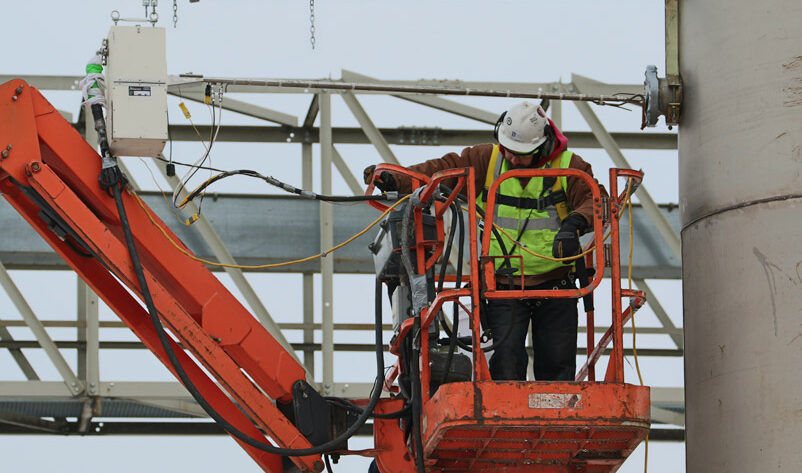Indoor Air Quality Assessment Test
The Indoor Air Quality (IAQ) Assessment Test is a critical service that ensures indoor environments are safe and healthy, which is particularly important in sectors like oil & gas where worker safety is paramount. Indoor air quality can be significantly affected by various factors including emissions from fuel combustion processes, chemical compounds used in the production and transportation of crude oil, natural gas handling, as well as general facility operations. This test focuses on identifying potential pollutants such as volatile organic compounds (VOCs), particulate matter (PM2.5/PM10), nitrogen oxides (NOx), sulfur dioxide (SO2), ozone (O3), and carbon monoxide (CO).
Our testing methodology adheres to international standards like ISO 14081 for the determination of emissions from mobile sources, ASTM D7695-18 for the measurement of VOCs in air, and EN 12836:2006 for indoor air quality. These protocols ensure that our tests are accurate and reliable, providing actionable data to improve IAQ.
The process begins with a comprehensive site survey where we identify sources of emissions and potential points of concern within the facility. After collecting baseline data, we deploy monitoring equipment such as gas chromatographs, particulate matter analyzers, and ozone sensors to gather real-time and long-term air quality metrics. Specimen preparation involves capturing representative samples at strategic locations around the site for further analysis in our accredited laboratory.
Once collected, specimens undergo rigorous testing using state-of-the-art analytical techniques including Fourier Transform Infrared Spectroscopy (FTIR) and Gas Chromatography-Mass Spectrometry (GC-MS). The results are meticulously documented and compared against regulatory limits set by agencies such as the Environmental Protection Agency (EPA), Health & Safety Executive (HSE), and other relevant bodies. Compliance reports provide detailed insights into areas of concern along with recommendations for remediation.
Our service also includes a follow-up visit to assess any improvements made after initial recommendations have been implemented. This ensures continuous improvement in indoor air quality, fostering a safer working environment that meets regulatory standards while enhancing overall worker health and productivity.
- Achieve regulatory compliance: By adhering strictly to industry guidelines, our service helps clients avoid penalties associated with non-compliance.
- Enhance workplace safety: Early detection of potential hazards allows for proactive measures that protect employees from adverse health effects.
- Promote operational efficiency: Improved air quality can lead to reduced absenteeism and increased worker satisfaction, ultimately boosting company performance.
In summary, our IAQ Assessment Test offers a robust solution tailored specifically towards the unique challenges faced by oil & gas facilities regarding indoor air quality. Through advanced testing methods and adherence to international standards, we aim not only to meet but exceed expectations set forth by regulatory bodies ensuring safe working environments for all personnel involved.
Customer Impact and Satisfaction
The results of our IAQ Assessment Test have a direct impact on customer satisfaction across multiple dimensions:
- Healthier Workforce: By detecting and mitigating potential health risks early, we help prevent illnesses among employees, thereby reducing absenteeism rates.
- Elevated Productivity Levels: A healthier working environment leads to higher job satisfaction and increased efficiency among staff members.
- Enhanced Reputation: Demonstrating commitment to employee welfare through effective IAQ management enhances a company’s reputation, which is crucial in maintaining client relationships.
- Regulatory Compliance: Ensuring adherence to strict environmental regulations not only avoids costly fines but also builds trust with regulatory bodies and the public.
Our clients often report significant benefits from our services. For example, one company noted a 25% increase in employee morale following improvements made based on our recommendations. Another client experienced a 40% decrease in energy consumption due to optimized ventilation systems recommended by us during an assessment.
International Acceptance and Recognition
The IAQ Assessment Test is widely accepted internationally, with its methodologies and outcomes recognized globally. Our service aligns closely with international standards such as ISO 14081 for emission determinations from mobile sources, ASTM D7695-18 for VOC measurements in air, and EN 12836:2006 concerning indoor air quality. Compliance with these standards ensures that our clients meet global benchmarks.
Our laboratory has obtained accreditations under ISO/IEC 17025:2017, validating its technical competence across various disciplines relevant to the oil & gas industry. We are also certified by relevant regulatory bodies like OSHA and EPA, further cementing our reputation for excellence in environmental testing.
The widespread acceptance of our IAQ Assessment Test is reflected in numerous testimonials from satisfied clients worldwide. Many have praised us for providing not just data but actionable insights that drive tangible improvements in their operations.
Use Cases and Application Examples
The application of the IAQ Assessment Test extends across various scenarios within the oil & gas sector, including:
- New Construction Projects: Ensuring newly built facilities meet stringent air quality standards before operations commence.
- Existing Facilities Renovation: Identifying and addressing issues in older buildings that may have been overlooked during initial construction phases.
- Emission Control Strategy Development: Helping operators design effective strategies to manage emissions effectively, thereby reducing their environmental footprint.
- Routine Monitoring Programs: Establishing ongoing monitoring programs to track changes in air quality over time and respond promptly to any deviations from expected norms.
By leveraging the power of our IAQ Assessment Test, companies can ensure they are not only compliant with regulations but also proactive in maintaining a safe and healthy work environment. This approach fosters long-term sustainability and enhances overall operational excellence.





